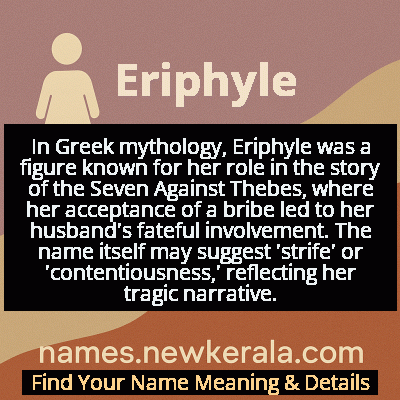Eriphyle Name Meaning & Details
Origin, Popularity, Numerology Analysis & Name Meaning of Eriphyle
Discover the origin, meaning, and cultural significance of the name ERIPHYLE. Delve into its historical roots and explore the lasting impact it has had on communities and traditions.
Name
Eriphyle
Gender
Female
Origin
Greek
Lucky Number
8
Meaning of the Name - Eriphyle
In Greek mythology, Eriphyle was a figure known for her role in the story of the Seven Against Thebes, where her acceptance of a bribe led to her husband's fateful involvement. The name itself may suggest 'strife' or 'contentiousness,' reflecting her tragic narrative.
Eriphyle - Complete Numerology Analysis
Your Numerology Number
Based on Pythagorean Numerology System
Ruling Planet
Saturn
Positive Nature
Ambitious, efficient, realistic, and authoritative.
Negative Traits
Materialistic, stressed, confrontational, and can be overly ambitious.
Lucky Colours
Dark blue, black.
Lucky Days
Saturday.
Lucky Stones
Blue sapphire, amethyst.
Harmony Numbers
2, 4, 6.
Best Suited Professions
Business leaders, managers, financial services, law enforcement.
What People Like About You
Leadership, determination, organizational skills.
Famous People Named Eriphyle
Eriphyle of Argos
Mythological Figure
Central figure in the Seven Against Thebes myth whose betrayal of her husband Amphiaraus led to his death
Eriphyle (Literary Character)
Classical Literary Figure
Appears in multiple Greek tragedies including works by Aeschylus and Euripides as a symbol of feminine betrayal
Eriphyle (Art Subject)
Mythological Art Figure
Featured in numerous classical and Renaissance artworks depicting the necklace of Harmonia and her tragic story
Name Variations & International Equivalents
Click on blue names to explore their detailed meanings. Gray names with will be available soon.
Cultural & Historical Significance
Beyond her immediate mythological role, Eriphyle's legacy extends through classical literature and art. She appears in Homer's Odyssey, Pindar's odes, and multiple Greek tragedies where playwrights used her story to explore themes of fate, free will, and moral responsibility. Her son Alcmaeon's eventual matricide to avenge his father creates a cycle of violence that fascinated Greek audiences. In Renaissance and Baroque art, Eriphyle became a popular subject for painters exploring dramatic mythological scenes, often depicted at the moment of receiving the fatal necklace or being confronted by her vengeful son. This enduring cultural presence demonstrates how her story continued to resonate across centuries as a complex exploration of human weakness and consequence.
Extended Personality Analysis
The name Eriphyle carries distinct personality associations derived from its mythological origins. Individuals with this name are often perceived as possessing a complex blend of charisma and potential destructiveness. They typically exhibit strong persuasive abilities and natural leadership qualities, though these traits may be channeled toward self-serving ends. The mythological Eriphyle's defining characteristic was her susceptibility to material temptation, suggesting that modern namesakes might struggle with balancing ambition and ethics. However, this also indicates a person who appreciates beauty, luxury, and the finer things in life.
Contemporary psychological interpretations suggest Eriphyles are often strategic thinkers with excellent social intelligence. They understand human motivations and can manipulate social situations to their advantage. This makes them effective in careers requiring persuasion and influence, though it may create trust issues in personal relationships. The name also suggests someone who faces significant moral dilemmas and may be torn between personal desires and responsibilities to others. Despite the negative mythological associations, modern Eriphyles might reinterpret this legacy as representing strong agency and the courage to make difficult choices, even when those choices have serious consequences. The personality profile ultimately depicts a complex individual capable of both great influence and significant personal turmoil.
Modern Usage & Popularity
In contemporary naming practices, Eriphyle remains exceptionally rare and is primarily confined to academic and classical enthusiast circles. The name has never achieved significant popularity in modern times due to its strong negative mythological associations and complex pronunciation. Current usage is mostly limited to Greece among families with strong classical education backgrounds, and even there it appears infrequently. The name's association with betrayal and the tragic consequences of greed make it a challenging choice for modern parents, despite the growing trend of reviving mythological names. In recent decades, as names like Persephone, Athena, and Calliope have gained popularity, Eriphyle has seen minimal increase in usage due to its particularly dark narrative. The name occasionally appears in historical fiction, video games based on mythology, and academic contexts rather than as a given name for newborns. Its modern usage reflects a preference for mythological names with more positive or neutral associations rather than those carrying heavy moral warnings.
Symbolic & Spiritual Meanings
Eriphyle embodies rich symbolic meanings that extend beyond her literal mythological story. She represents the eternal conflict between material desire and moral integrity, serving as a powerful symbol of how temptation can corrupt even the most sacred bonds. The necklace of Harmonia that she accepted as a bribe symbolizes the deceptive nature of beautiful objects and how outward splendor can conceal destructive consequences. This makes Eriphyle a cautionary symbol about the price of prioritizing material wealth over relationships and ethical principles.
Metaphorically, Eriphyle also represents the complex position of women in patriarchal societies, where their power was often exercised indirectly through persuasion and manipulation rather than direct action. Her story symbolizes the limited agency available to women in ancient times and the tragic outcomes that could result when that agency was misdirected. Modern feminist interpretations see her as a symbol of female complexity—neither purely villainous nor entirely victimized, but a multifaceted character making difficult choices within constrained circumstances. Additionally, Eriphyle symbolizes the intergenerational consequences of actions, as her betrayal ultimately led to her own death at the hands of her son, creating a cycle of violence that underscores how individual choices can reverberate through families and generations.

